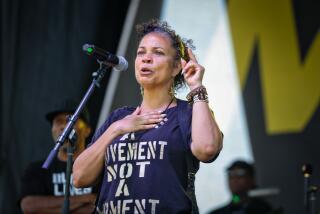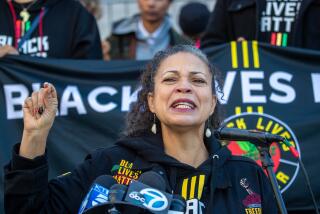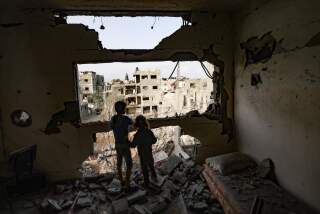British suspect’s beliefs drove him, friends say
LONDON — Bilal Abdullah was an angry militant Islamist long before he became a doctor in Britain or a chief suspect in last week’s attempted car bombings in London and Glasgow, according to acquaintances.
The Iraqi doctor spoke fluent English, studied for his British medical exams in Cambridge and worked part time at a local Staples office supply store, according to a friend from those days in 2004 and 2005.
Abdullah also praised former Al Qaeda in Iraq leader Abu Musab Zarqawi, and kept his group’s videos showing beheadings and assaults. He cheered the killing of U.S. and British troops, and wanted to see a strict Islamic government in Iraq, as well as Islamic dominance around the world.
He was warm with his fundamentalist Sunni friends, but quick to brand other Muslims and non-Muslims as infidels.
“He was known as a hard-core militant,” Shiraz Maher, a former member of the international Islamist group Hizb ut-Tahrir, said Wednesday in an interview.
British security officials now say that Abdullah, 27, and another suspect, Khalid Ahmed, were front-line operatives in the London and Glasgow, Scotland, plots.
They believe that Abdullah and Khalid, reportedly his roommate in Scotland, each drove a Mercedes sedan rigged with gasoline and nails from Glasgow down to London and tried to set them off Friday with cellphone detonators. When the bombs failed to go off, the two rushed back to Glasgow separately and launched a second attack, driving a gasoline-filled Jeep Cherokee into the main terminal of Glasgow Airport, a British security official said.
Their attempted attack on the airport Saturday “has all the hallmarks of an improvised Plan B” that they came up with as police closed in, said the official, who spoke on condition of anonymity.
“They couldn’t have done much reconnaissance on the airport,” he said. “It seems very much like a botched attempt they organized on the fly.”
Abdullah was held at the scene of the Glasgow attack and is in custody in London. Ahmed, who was badly burned in the crash, is in the Royal Alexandra Hospital in Paisley, Scotland, where he is believed to have worked with Abdullah. His nationality has been reported in the British media as either Lebanese or Iraqi.
At least six other people have been detained in connection with the plots: a Jordanian neurosurgeon, Mohammed Jameel Asha, who worked at the North Staffordshire Hospital in Stoke on Trent, and his lab technician wife, Marwa; an Indian doctor, Mohammed Haneef, who worked at Halton Hospital in Cheshire, south of Liverpool, and was held in Brisbane, Australia; Sabeel Ahmed, a postgraduate medical trainee from India who reportedly worked in Cheshire with Haneef, his second cousin; and two unidentified Saudi medical students who worked at the Royal Alexandra Hospital.
So far, none of the eight has been charged.
How all of these people are connected has not been fully established, but several may have first encountered each other in Cambridge. In 2005, Asha worked in neurosurgery at Addenbrooke’s Hospital, a teaching facility affiliated with Cambridge University, Channel Four news in Britain reported. A hospital spokesman would not comment, saying the “matter of national security is under police investigation.”
At the same time, Sabeel Ahmed also was in Cambridge, where his brother was studying. Channel Four quoted a friend of the doctors as saying Abdullah and Ahmed were close friends.
Investigators are looking for possible links to Al Qaeda in Iraq, given Abdullah’s background. A senior British cleric working in Baghdad said that he had met a suspected Al Qaeda leader in Jordan in April who warned that “those who cure you are going to kill you.”
Canon Andrew White of Baghdad’s only Anglican parish said he passed a general warning to the British government, but not the specific language because he didn’t see its significance at the time. Since the attempted bombings, White said, he has come to believe the Sunni leader was sending a message about the doctors.
British security officials say no direct links to Al Qaeda have yet been found, and terrorism experts are skeptical that there is one. Abdel Bari Atwan, author of “The Secret History of Al Qaeda,” noted in an interview Wednesday that Al Qaeda operations in London, Bali and Madrid all were deadly accurate, whereas last week’s attacks were rudimentary and unsuccessful.
“Al Qaeda in Iraq is very experienced. They manufacture car bombs every day. They know how to detonate bombs, where to park them, how to select targets,” said Atwan, who is editor of the London-based Al Quds al Arabi newspaper.
In previous cases in Britain, one or two key players directed and trained by foreign terrorist networks were given autonomy to create their own cells. In both the London transit bombings of July 7, 2005, and the botched attempts two weeks later, the alleged ringleaders are accused of training with Al Qaeda operatives in Pakistan, then quickly recruiting accomplices in the British capital who had no overseas contacts.
In this case, Abdullah seems a likely ringleader because he showed signs of radicalism before most of the other suspects and because of his connections to militant Islamic circles in Iraq, the security official said.
Some news media reported that Abdullah was born in England when his father worked here as a doctor, and may even have had a British passport, although this could not be independently confirmed. Since 1983, not all persons born in Britain are entitled to citizenship.
Abdullah grew up in Iraq, and people who knew him there said he began to show militant leanings as a teenager. One Shiite friend from primary school who asked not to be identified for reasons of safety said that as Abdullah became more and more religious, he distanced himself and began expressing distaste for Shiites, Christians and others whom he considered infidels.
A doctor who works in the Baghdad hospital compound known as Medical City and knows both Abdullah and his father said that by the time Abdullah was a medical student at Baghdad University, he was known as an adherent of Wahhabism, a radical form of Islam also known as Salafism.
“He was so deep in religion,” the doctor said, noting that even during Saddam Hussein’s secular reign Abdullah wore a beard and the ankle-baring pants that Islamists wear based on a reputed direction of the prophet Muhammad.
Abdullah reportedly received his medical degree from Baghdad University in 2004 and moved to Cambridge to study for his qualifying test to practice in England. That is when he met Maher, who said he tried to recruit Abdullah into Hizb ut-Tahrir, which calls for the reestablishment of a Muslim caliphate. Abdullah apparently found the group too moderate.
“He would speak out about the insurgent attacks on American and British troops. He was quite glad when they happened,” Maher said. “Also the sectarian conflict -- he approved of the attacks on Shias.... He saw Shias as apostates.”
The 25-year-old Maher, who broke with Hizb ut-Tahrir in 2005, said Abdullah’s extremist ideology was honed by the war in Iraq. He was particularly incensed over the U.S. offensive in Fallouja during the Islamic holy month of Ramadan, which fell in November in 2004, and he, Maher and a few others drove down for prayers at the Regents Park Mosque in London.
“Bilal on that night was the most dedicated in prayer. His stamina was something to behold. The others, we would take breaks, go to the cafe in the mosque, but he just stayed in the prayer hall. By the end, he had worked his way up to the front of the prayer hall and the rest of us were waiting for him so we could go,” Maher said.
“It would be pretty speculative to say he was already in contact with terrorist groups,” Maher said. “But given what is coming out now, I don’t find it hard to believe.”
Abdullah lived spartanly in Cambridge in a flat rented from the Abu Bakr Siddiq Mosque, sleeping on a mattress on the floor. He was warm and friendly with a group of about 25 like-minded Muslims at Hizb ut-Tahrir’s Islamic Academy, and often gave them summaries of Arabic media and Internet perspectives on world events. He once got Maher a big discount on a chair at the Staples store where he worked as a salesman.
But Abdullah was angry and even threatening with others whom he considered insufficiently devout. His roommate at the time was a non-practicing Muslim who played the guitar and sang, Maher said.
“It disgusted Abdullah. He told me that one day he brought the guy into his room and gave him a lecture,” Maher said. “He told him, ‘You better start praying and stop playing music.’ He showed him a Zarqawi video of a beheading and told him, ‘If you don’t listen to me, remember that this is what my people do -- we slaughter.’ ”
--
[email protected] [email protected]
Miller reported from London and Rotella from New York. Times staff writers Alexandra Zavis in Amman, Jordan, and Janet Stobart in London, correspondents in Baghdad and special correspondent Justin Gest in London contributed to this report.
More to Read
Sign up for Essential California
The most important California stories and recommendations in your inbox every morning.
You may occasionally receive promotional content from the Los Angeles Times.










